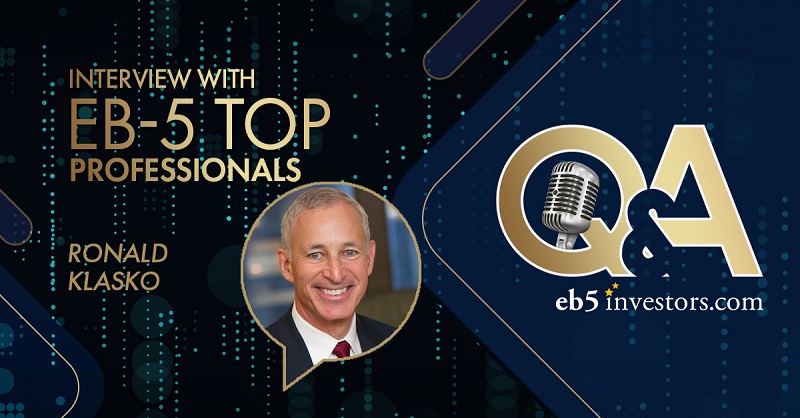
Immigration Attorney H. Ronald Klasko, founder and managing partner of Klasko Immigration Law Partners,got involved in the EB-5 industry in 1991, before there was a regional center program. His first involvement was to put together a book of middle-market investment opportunities that wanted to attract investment capital. He then spent time in various Asian countries meeting with sources of investors in order to match the investors with the investment opportunities.
“I considered then – and I consider now – EB-5 to be a win-win-win proposition,” he said. “It is a win for investors, who have an opportunity to immigrate to the U.S. that they otherwise would not have. It is a win for project developers in that it provides sources of low-cost capital that otherwise might not be available. It is a win for the country in that it provides significant amounts of foreign direct investment and creates hundreds of thousands of jobs. Parenthetically, it has also been a win for our law firm in that it has provided a new, profitable practice area.”
What are some current trends you are seeing in the EB-5 market?
On the investor side, we are seeing somewhat of an uptick in investor interest now that we are more than a year after the significant investment amount increase. We are – I guess unfortunately – seeing a substantial increase in business relating to defending against regional center terminations, dealing with projects gone bad and litigating denials. On an industry level, the major issues are the expiration of the regional center program on June 30 and the prodigious task of getting EB-5 legislation passed through the congress and signed by the president before June 30 in order to extend the program. We are also monitoring closely the possibility that the EB-5 regulation increasing the investment amount may be invalidated by a federal court based on the improper appointment of DHS Secretary Chad Wolf.
How do you think the pandemic has impacted the EB-5 industry?
The pandemic has had a number of effects. Consular closures have prevented EB-5 immigrants from obtaining their immigrant visas. Many prospective investors have rethought or delayed plans given inability to travel internationally. EB-5 regional center projects have in many cases been delayed because of the pandemic. Direct EB-5 projects – restaurants are a good example – have suffered, experienced reductions in employment or closed because of the pandemic. All of these effects create challenges for us. Happily, we have been able to find solutions for our clients to deal with each of these issues.
What are your thoughts about the redeployment situation?
Our law firm has filed multiple complaints in federal courts challenging the July 24, 2020 USCIS policy on redeployment. The biggest issue on redeployment, which we are challenging, is the newly created and retroactively applied requirement that the redeployment occur within the geographic boundaries of the regional center. We believe this is incorrect both as a matter of law and as a matter of violation of APA notice and comment rulemaking. It is also invalid because it was promulgated under the leadership of an acting director of USCIS who was not properly appointed under the Federal Vacancies Reform Act.
What do you think needs to be reformed in EB-5 program?
I believe the EB-5 Reform and Integrity Act, which is the vehicle to achieve a long-term extension of the regional center program before its expiration on June 30, is both flawed and necessary. Although there are a number of provisions in the bill with which I disagree, I think it is the best that the industry will get in the time we have to get it. My biggest concern with the legislation is that it would strip the federal courts of jurisdiction over denials of all petitions with respect to EB‑5 absent the futile and lengthy requirement of appealing to the AAO. I am involved in efforts to strip or modify this provision.
What are your top business goals this year?
Our law firm is a full-service immigration law firm. EB-5 is only one part of the firm. Our goals will be to see all aspects of the practice increase in the post-pandemic months. In addition, we have significant EB-5 cases pending in federal court, which we anticipate may produce positive results that will benefit the industry.
What achievement in this market has been most rewarding for you?
My five years as chair of the EB-5 Committee of the American immigration Lawyers Association were very rewarding. Happily, those years coincided with the years in which the director of USCIS, Alejandro Mayorkas, was very receptive to ideas on how to improve the EB-5 program. I also very much valued my tenure as chair of the IIUSA Best Practices Committee, in which capacity we were able to craft comprehensive best practices for the EB-5 industry.
What about you would surprise others?
Two of my hobbies might surprise others. I recently retired from a 20-year baseball – hardball‑ career. Another one of my areas of interest is radio. Among other things, I have been the general manager of a radio station, been a college football and basketball announcer and been a Top 40‑disc jockey.
DISCLAIMER: The views expressed in this article are solely the views of the author and do not necessarily represent the views of the publisher, its employees. or its affiliates. The information found on this website is intended to be general information; it is not legal or financial advice. Specific legal or financial advice can only be given by a licensed professional with full knowledge of all the facts and circumstances of your particular situation. You should seek consultation with legal, immigration, and financial experts prior to participating in the EB-5 program Posting a question on this website does not create an attorney-client relationship. All questions you post will be available to the public; do not include confidential information in your question.








